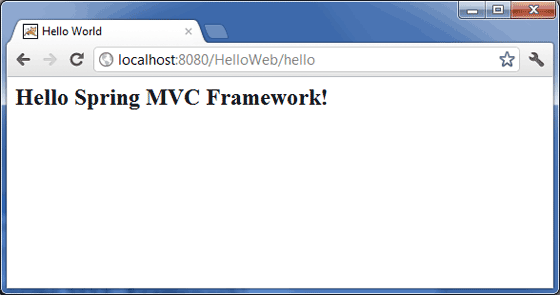Spring MVC - ตัวอย่างสวัสดีชาวโลก
ตัวอย่างต่อไปนี้แสดงวิธีการเขียนเว็บอย่างง่าย Hello Worldแอปพลิเคชันโดยใช้ Spring MVC Framework ในการเริ่มต้นให้เรามี Eclipse IDE ที่ใช้งานได้และทำตามขั้นตอนต่อไปเพื่อพัฒนา Dynamic Web Application โดยใช้ Spring Web Framework
| ขั้นตอน | คำอธิบาย |
|---|---|
| 1 | สร้างโครงการเว็บแบบไดนามิกด้วยชื่อ HelloWeb และสร้างแพ็คเกจ com.tutorialspoint ภายใต้โฟลเดอร์ src ในโครงการที่สร้างขึ้น |
| 2 | ลากและวาง Spring ต่อไปนี้และไลบรารีอื่น ๆ ลงในโฟลเดอร์ WebContent/WEB-INF/lib.. |
| 3 | สร้างคลาส Java HelloController ภายใต้แพ็คเกจ com.tutorialspoint |
| 4 | สร้างการกำหนดค่า Spring files web.xml และ HelloWeb-servlet.xml ภายใต้โฟลเดอร์ WebContent / WEB-INF |
| 5 | สร้างโฟลเดอร์ย่อยที่มีชื่อ jspภายใต้ WebContent / WEB-INFfolder สร้างไฟล์ดูhello.jsp ภายใต้โฟลเดอร์ย่อยนี้ |
| 6 | ขั้นตอนสุดท้ายคือการสร้างเนื้อหาของไฟล์ต้นทางและการกำหนดค่าและส่งออกแอปพลิเคชันตามที่อธิบายด้านล่าง |
HelloController.java
package com.tutorialspoint;
import org.springframework.stereotype.Controller;
import org.springframework.web.bind.annotation.RequestMapping;
import org.springframework.web.bind.annotation.RequestMethod;
import org.springframework.ui.ModelMap;
@Controller
@RequestMapping("/hello")
public class HelloController{
@RequestMapping(method = RequestMethod.GET)
public String printHello(ModelMap model) {
model.addAttribute("message", "Hello Spring MVC Framework!");
return "hello";
}
}web.xml
<web-app id = "WebApp_ID" version = "2.4"
xmlns = "http://java.sun.com/xml/ns/j2ee"
xmlns:xsi = "http://www.w3.org/2001/XMLSchema-instance"
xsi:schemaLocation = "http://java.sun.com/xml/ns/j2ee
http://java.sun.com/xml/ns/j2ee/web-app_2_4.xsd">
<display-name>Spring MVC Application</display-name>
<servlet>
<servlet-name>HelloWeb</servlet-name>
<servlet-class>
org.springframework.web.servlet.DispatcherServlet
</servlet-class>
<load-on-startup>1</load-on-startup>
</servlet>
<servlet-mapping>
<servlet-name>HelloWeb</servlet-name>
<url-pattern>/</url-pattern>
</servlet-mapping>
</web-app>HelloWeb-servlet.xml
<beans xmlns = "http://www.springframework.org/schema/beans"
xmlns:context = "http://www.springframework.org/schema/context"
xmlns:xsi = "http://www.w3.org/2001/XMLSchema-instance"
xsi:schemaLocation = "
http://www.springframework.org/schema/beans
http://www.springframework.org/schema/beans/spring-beans-3.0.xsd
http://www.springframework.org/schema/context
http://www.springframework.org/schema/context/spring-context-3.0.xsd">
<context:component-scan base-package = "com.tutorialspoint" />
<bean class = "org.springframework.web.servlet.view.InternalResourceViewResolver">
<property name = "prefix" value = "/WEB-INF/jsp/" />
<property name = "suffix" value = ".jsp" />
</bean>
</beans>hello.jsp
<%@ page contentType = "text/html; charset = UTF-8" %>
<html>
<head>
<title>Hello World</title>
</head>
<body>
<h2>${message}</h2>
</body>
</html>ต่อไปนี้เป็นรายชื่อ Spring และไลบรารีอื่น ๆ ที่จะรวมอยู่ในเว็บแอปพลิเคชัน เราสามารถลากไฟล์เหล่านี้และวางลงใน -WebContent/WEB-INF/lib โฟลเดอร์
servlet-api-x.y.z.jar
commons-logging-x.y.z.jar
spring-aop-x.y.z.jar
spring-beans-x.y.z.jar
spring-context-x.y.z.jar
spring-core-x.y.z.jar
spring-expression-x.y.z.jar
spring-webmvc-x.y.z.jar
spring-web-x.y.z.jar
เมื่อคุณสร้างไฟล์ซอร์สและไฟล์คอนฟิกเสร็จเรียบร้อยแล้วให้ส่งออกแอปพลิเคชันของคุณ คลิกขวาที่แอปพลิเคชันของคุณใช้Export → WAR File ตัวเลือกและบันทึกไฟล์ HelloWeb.war ไฟล์ใน Tomcat's webapps โฟลเดอร์
ตอนนี้เริ่มเซิร์ฟเวอร์ Tomcat ของคุณและตรวจสอบให้แน่ใจว่าคุณสามารถเข้าถึงหน้าเว็บอื่น ๆ จากโฟลเดอร์ webapps โดยใช้เบราว์เซอร์มาตรฐาน ตอนนี้พยายามเข้าถึง URL -http://localhost:8080/HelloWeb/hello. หากทุกอย่างเรียบร้อยดีกับ Spring Web Application เราจะเห็นหน้าจอต่อไปนี้

คุณควรทราบว่าใน URL ที่กำหนด HelloWebคือชื่อแอปพลิเคชันและสวัสดีคือโฟลเดอร์ย่อยเสมือนซึ่งเราได้กล่าวถึงในคอนโทรลเลอร์ของเราโดยใช้ @RequestMapping ("/ hello") คุณสามารถใช้รูทโดยตรงขณะแมป URL ของคุณโดยใช้@RequestMapping("/")ในกรณีนี้คุณสามารถเข้าถึงเพจเดียวกันโดยใช้ URL แบบสั้น http://localhost:8080/HelloWeb/แต่ขอแนะนำให้มีฟังก์ชันการทำงานที่แตกต่างกันภายใต้โฟลเดอร์ต่างๆ